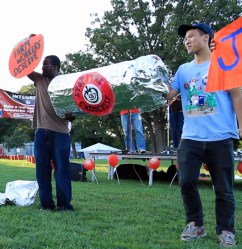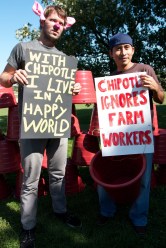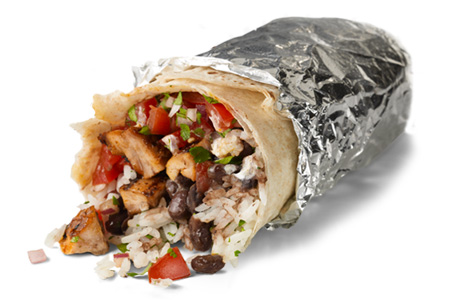
Protesters outside the Chipotle Cultivate festival in Chicago. (Photo by Just Harvest.)
It’s a long drive from Florida to Denver, but Leonel Perez and his colleagues at the Coalition of Immokalee Workers (CIW) don’t mind. In fact, they arrived in the Mile High City three weeks early for Cultivate, a food, beer, and music festival sponsored by Chipotle Mexican Grill.
They were not drawn by a love of burritos. In the days leading up to Cultivate, Perez, Jake Ratner, an organizer for Just Harvest USA, and several other CIW organizers will hold dozens of community events, speak at many churches, and give classroom presentations at all Denver’s major universities. Then, on Oct. 6, the day of the festival, Perez will build a giant stack of tomato buckets just outside the festival to represent the daily toil of 30,000 impoverished tomato workers.
Over the last decade, Perez and others at CIW have pressured major food companies like McDonald’s, Whole Foods, and Sodexho to join something called the Fair Food Program. Now, they’re ratcheting up pressure on the burrito giant in hopes of a similar deal.
“We’ll continue these demonstrations until Chipotle signs,” says Ratner.
Ordering at Chipotle is famously simple: Select one of four meats, then black beans or pinto, then salsas. The company’s politics, on the other hand, are maddeningly complex. Why won’t Chipotle — a company that has gone to great lengths to broadcast its high-quality, “ethical” food — shake hands with tomato workers?
Just as important, why aren’t more people upset with Chipotle’s intransigence?
What the Ells is going on?
The impoverished Florida village of Immokalee is the epicenter of the U.S. tomato industry. From December to May, 90 percent of the nation’s tomatoes come out of these fields. They’re picked by a fluid workforce of more than 30,000 migrant laborers who have suffered beatings, sexual assault, wage theft, and slavery [PDF]. If that weren’t enough, the pay is poor and the conditions subhuman.
A number of nonprofits have rallied to the CIW’s cause: Rater’s Just Harvest, plus the Student/Farmworker Alliance, Interfaith Action of Southwest Florida, the Alliance for Fair Food, and Rabbis for Human Rights – North America. The campaign began with a boycott of Taco Bell in 2001. Since then, it and nine leading companies have committed to the Fair Food Program.
 Food companies that join the program enter binding contracts with the CIW. They agree to pay a penny more per pound directly to the workers, which doesn’t sound like much but significantly raises their take-home pay. The program also requires shade tents and ice water in the fields, health and safety monitors, sessions to educate workers about their rights, and a confidential enforcement program run by the Fair Food Standards Council in nearby Sarasota. A grower who doesn’t stick to the agreement risks losing his ability to sell to the 10 big fast food and grocery retailers who have signed on.
Food companies that join the program enter binding contracts with the CIW. They agree to pay a penny more per pound directly to the workers, which doesn’t sound like much but significantly raises their take-home pay. The program also requires shade tents and ice water in the fields, health and safety monitors, sessions to educate workers about their rights, and a confidential enforcement program run by the Fair Food Standards Council in nearby Sarasota. A grower who doesn’t stick to the agreement risks losing his ability to sell to the 10 big fast food and grocery retailers who have signed on.
Over the last 18 months, organizers like Ratner and Perez have intensified their efforts to get Chipotle to sign. In May 2011, University of Colorado students protested the commencement address given by Chipotle CEO Steve Ells. On May 1 of this year, protesters affiliated with the Occupy movement condemned Chipotle during a march through New York City. On July 27, CIW and Just Harvest coordinated protests at Chipotle restaurants in 25 cities.
Considering the appalling conditions and the worthy alternative offered by the Fair Food Program, why won’t Chipotle sign on? It’s a mystery complicated by the company’s refusal to take a consistent position. As Leonel Perez, a CIW organizer, explains, “Every time [CIW approaches Chipotle], they seem to have another excuse.” (CIW has even issued a point-by-point rebuttal of Chipotle’s “explanations.”)
It’s hard to be sure, but some organizers believe the resistance has come from the highest levels of Chipotle, perhaps even from CEO and chair Steve Ells himself. Ells is different from a lot of food executives because he started the company and rolled its first burritos. He loves to tell an I-saw-the-light story about visiting a farm and realizing that most pigs don’t have great lives, and has often championed the values behind Chipotle.
But those values get complicated fast when you’re talking about an enormous mobile workforce, and it’s not clear that Ells gets that. Says Ratner, “You can’t take the same top-down approach that you might use for humane treatment of animals and just apply it to farmworkers. It takes the recognition of those workers as equal partners every bit as important as Chipotle’s customers.”
Other organizers believe that Ells hasn’t bothered to read the many reputable reports (not to mention the award-winning book Tomatoland) that have come out of Florida’s abominable tomato fields.
“That’s why time and time again the CIW has invited Ells to Immokalee,” Ratner says.
Whose integrity — Chipotle’s or its customers’?

Organizers set up a row of the buckets used in the tomato harvest to engage festival attendees in conversation about the conditions of workers.
The Cultivate festival provides a high-visibility opportunity for organizers — who stack tomato buckets, talk about the harsh realities of workers’ lives, and encourage people to get involved in the campaign. The festival also demonstrates Chipotle’s phenomenal success. At the Chicago edition of Cultivate, held in September, thousands of festivalgoers — mostly young and white — crowded before the main stage to hear a lineup anchored by G Love. They sipped local microbrews and watched cooking demos by star chefs like Richard Blais and Paul Kamen featuring ingredients from area farms. They bought tofu tacos and sampled the fare at Chipotle’s new Asian concept restaurant. Want to learn about Chipotle’s wonderful relationship with avocado farmers or test out an iPad game called Pig2Pasture? There were booths for that, too. At each, Chipotle staff stamped your festival program. Collect four stamps and you landed a coupon for a free burrito.
If the festival sounds like a roaring success, try reading Chipotle’s annual report. The company’s revenue has tripled since 2006. In 2011, it earned a staggering $2.24 billion.
That suggests two things. First, a burrito boycott is not going to work. Second, the deplorable conditions in Immokalee have not yet dented Chipotle’s reputation.
Why not? Usually, the specter of human slavery at least makes consumers think twice.
It turns out that Chipotle’s vaunted “Food with Integrity” campaign — as illustrated by its pasture-raised, rBGH-free sour cream, for instance — probably helps insulate the company from whatever outrage people feel at its underwhelming human rights record.
I talked to Marc LiVecche, an ethicist at the University of Chicago, about how a huge concern like slavery could fail to affect people’s buying habits.
“There’s definitely a feeling of moral exhaustion that sets in,” LiVecche explained. “Folks begin to wonder how many issues they might possibly need to keep track of when shopping. The tacit perception sets in that it’s too hard to walk around in modern life and have integrity 100 percent of the time. When facing questions about a particular company, people look for trustworthy authorities. If they’ve heard good reports about that company, that can counterbalance the issue that’s being raised.”
In other words, sour cream can trump slavery, given the right circumstances.
That does not deter organizers like Ratner and Perez. “Chipotle is symbolic of the divisions between the food movement and the food justice movement,” says Ratner. “It threatens the Fair Food Agreement. If corporations go it alone, as Chipotle wants to, it undermines the whole system of market consequences protecting the workers.”




